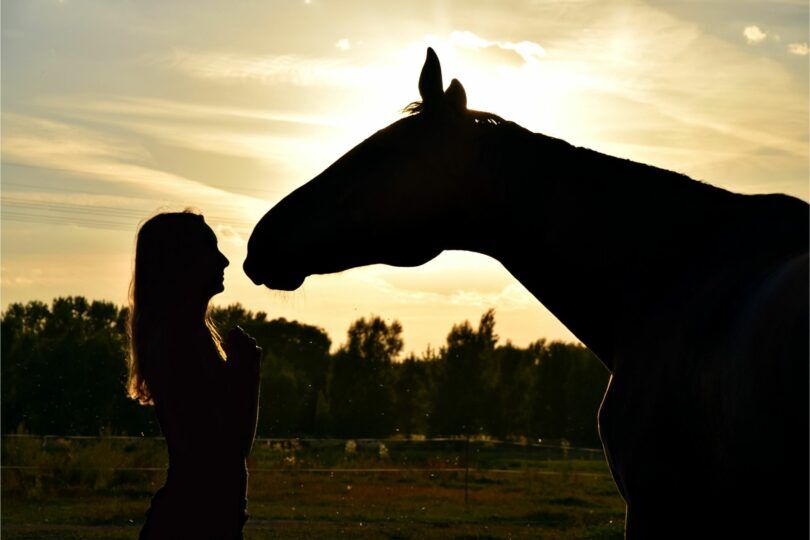A horse doesn’t need papers to make the grade!
If you’re looking to buy a horse, chances are good you’ve come across the word “grade” in an ad. Not sure what this means? You’re not alone.
A grade horse isn’t registered with a registry or organization. While this matters for certain types of competitions or breeding programs, grade horses are perfect for backyard fun. The biggest difference often comes down to price. “Papered” purebreds may offer more predictability in terms of their growth and personality, but grade horses can perform just as well (if not better!).
The Grade Horse Defined
Simply put, a grade horse is one whose breeding isn’t documented or is unknown. For example, if you buy a registered horse, but lose his papers, you now own a grade horse.
Source: Canva
What do you call a mixed breed horse?
This depends. Typically, a mixed breed horse is referred to as a grade horse. Sometimes, however, there is a registry for that mix, such as with Appendix horses (a Quarter Horse/Thoroughbred cross).
Pros and Cons
On the fence about purchasing a grade horse? Check out these pros and cons.
Benefits to a Grade Horse:
- Typically less expensive that papered horses
- No transfer fees (transferring ownership from one person to the next)
- No paperwork to keep track of
Drawbacks to a Grade Horse:
- Can’t compete in breed-specific shows
- Growth pattern is less predictable (i.e. not easy to know how tall/wide/long the horse will become)
- Harder to predict personality traits and trainability
- More difficult to prove ownership
- May be harder to resell
What types of riding grade horses can do
Any type of riding that involves a saddle! Knowing your horse’s bloodlines might give you a leg up on predicting size or discipline they might excel at, but I’ve known plenty of grade horses that can blow purebreds out of the water!
Where you can buy a grade horse
You can check out online auctions, sale websites, classified ads, etc. Sometimes, a breeder will sell a horse that could be registered as grade (meaning they either haven’t registered the horse or won’t give you the papers).
Frequently Asked Questions
Q: What does grade mean in horses?
Grade is just a fancy way of saying the horse isn’t registered, his breeding isn’t known, or that his papers have been lost.
Q: What happens if you lose your horse’s registration papers?
Congratulations, you now own a grade horse! All hope isn’t lost, though. Some registries, like AQHA, keep a copy on file. You’ll have to fill out a bunch of paperwork and submit photo verification, but you’ll be able to regain your horse’s registered status.
Q: How much does a grade horse cost?
Grade horses cost less than registered horses, so be wary of anyone who is charging in the high-four or five figures for a horse without papers. Generally, a grade horse will go for between $1,500 and $5,000, depending on things like their level of training and physical appearance (note: colors such as grays and paints will generally cost more than a chestnut, regardless of their breeding).
Q: Are any mixed breed horses able to be registered?
Yes! Not all registries require that their horses be 100%. Some require 50% of the breed in question. Others require as little as 25% or as much as 75%.
Typically, you need to have proof of your horse’s sire and dam and will need copies of their papers to show how much of each breed your horse is. Unless you’re planning to show or breed, however, registering your mixed breed horse isn’t necessary.
Parting Thoughts
Whether or not you buy a grade horse depends on what you’re looking for in your equine partner. If competing in rated shows or a breeding program is your dream, then stick with purebreds or registered horses. Otherwise, save yourself some money and purchase a well-trained grade horse. The view from the saddle is just as good.
P.S. Enjoy this article? Trot on over to:
- Elevate Your Ride With These 6 Tall Horse Breeds
- How to Weigh a Horse (Easy Step-by-Step Guide)
- Are You (Really) Ready for a Green Broke Horse?
- Heavyweight Champs: 5 Best Horse Breeds for Larger Riders
- Say Yes to the Horse: 11 Best Breeds for First Time Horse Owners
- 5 Best Horse Breeds for Rugged Mountain Hunting
- Keep Calm & Ride On: 3 Calmest Horse Breeds
- Friendly & Fun: 4 Best Horse Breeds for Beginners
- How much weight can a horse pull? (You’ll be surprised!)
